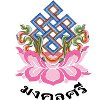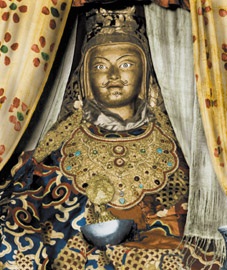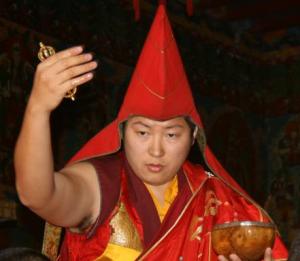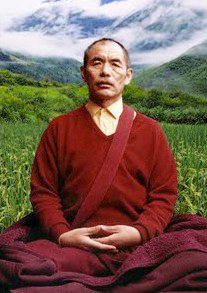A random act of kindness – Phakchok Rinpoche message in December 2011 สารจากท่าน พักชก ริมโปเช ในเดือน ธันวาคม 2554
|

We will be updating new events soon.
|
|
แด่สหายทั้งหลายที่อยู่ใกล้และอยู่ไกล สวัสดีทุกท่านเนื่องในวันคุรุรินโปเช หวังว่าทุกท่านคงมีสุขภาพที่ดีและมีความสุข เราทุกคนล้วนต้องการจะมีความสุข สิ่งนี้คือเป้าหมายพื้นฐานในชีวิตเราจริงหรือไม่? แต่บ่อยครั้งที่เรารู้สึกว่าเป็นการยากลำบากเหลือเกินที่จะเข้าถึงความสุข เมื่อใดก็ตามที่เราไม่รู้ว่าจะรับมือกับอารมณ์และจิตใจของเราอย่างไร เมื่อนั้นเราจะรู้สึกว่าชีวิตช่างน่าเหนื่อยหน่ายและตึงเครียด ด้วยเหตุนั้นในที่นี้ข้าพเจ้าจึงอยากมีส่วนร่วมกับท่านทั้งหลายในวิถีทางสามเรื่องง่ายๆ ที่ช่วยให้ข้าพเจ้าสามารถจัดการกับอารมณ์และความรู้สึกของข้าพเจ้า ซึ่งทำให้ข้าพเจ้าสุขสบายอยู่เสมอ
ทุกวันนี้เรามีสิ่งที่ต้องคิดคำนึงถึงมากมายเหลือเกิน ทั้งเรื่องสุขภาพ ครอบครัว หน้าที่การงาน และถ้าท่านเป็นผู้ฝึกปฏิบัติธรรมด้วยแล้วท่านยังมีภาระในการทำสมาธิและฝึกปฏิบัติธรรมที่ต้องเป็นห่วงอีก เมื่อใดก็ตามที่เราไม่รู้ว่าจะจัดการกับมันอย่างไรความกังวลนี้จะทำให้จิตใจของเราหดตัวลงที่ละน้อยๆ และมีขนาดแคบลงๆ ผลลัพธ์ที่เกิดขึ้นจะเป็นไปในทางเลวร้ายยิ่งขึ้นเรื่อยๆ จนบางครั้งดูเหมือนว่าสิ่งต่างๆ เริ่มท่วมท้นหนักหน่วงจนรู้สึกเหมือนกำลังติดกับดักและยังรู้สึกแน่นหน้าอก เราจะแสดงออกอย่างชัดเจนถึงความพยายามที่จะผ่อนคลายตัวเองจากความรู้สึกเหล่านั้น สิ่งนี้คงเกิดขึ้นกับเราบ้างในบางครั้งไม่มากก็น้อย แต่เรื่องเล็กๆ เหล่านี้ก็อาจกลายเป็นปัญหาใหญ่ที่เราไม่สามารถจัดการกับมันได้
วิธีการที่ยอดเยี่ยมประการหนึ่งในการจัดการกับสิ่งเหล่านี้คือการสร้างพื้นที่ว่างทางจิตใจขึ้น วิธีนี้จะช่วยปลดปล่อยอกุศลเจตนาและความตึงเครียดทั้งในจิตใจเช่นเดียวกับในร่างกายของท่าน การสร้างพื้นที่ว่างมีวิธีการที่ง่ายมาก มันไม่ใช่การสอนคำสอนทางพุทธศาสนาหรืออะไรทำนองนั้น หากเป็นเทคนิคง่ายๆ ที่เราสามารถประยุกต์ใช้กับพื้นที่ว่างและอิสรภาพของเรา และปลดปล่อยเราจากความกังวลทั้งมวล
แล้วเราจะสร้างที่ว่างได้อย่างไร? หากท่านมีเวลาสักเล็กน้อยลองมองตรงไปข้างหน้าและจินตนาการว่าท่านกำลังถูกล้อมรอบด้วยที่ว่างทุกทิศทุกทาง หากจำเป็นบางครั้งก็อาจใช้วิธีมองขึ้นไปบนท้องฟ้าที่ว่างเปล่า เพียงแค่จินตนาการว่าทุกหนทุกแห่งล้วนเป็นที่ว่าง ไม่มีกำแพง ไมมีขอบเขต ไม่มีตึกรามบ้านช่อง ไม่มีอะไรเลย และอย่าเริ่มต้นคิดถึงการงาน ครอบครัว คิดถึงเฉพาะสิ่งที่ท่านต้องการจะทำ จินตนาการง่ายๆ ว่าทุกสิ่งทุกอย่างล้วนเป็นพื้นที่ว่างกว้างใหญ่ ฟ้าโปร่งเหมือนที่ว่าง และปล่อยให้จิตใจของท่านผสมกลมกลืนไปกับพื้นที่ว่างดังกล่าวจนกลายเป็นพื้นที่ว่างและเปิดโล่งสุดลูกหูลูกตา ท่านอาจจะหลับตาลงหากสิ่งนี้ช่วยท่านได้ จินตนาการถึงความว่างเปล่านี้สักอึดใจหนึ่ง หลังจากเวลาผ่านไปสักนาทีหรือสองนาทีท่านจะเริ่มรู้สึกถึงความว่างในจิตใจอย่างแท้จริง หน้าอกของท่านจะโล่งและท่านจะรู้สึกถึงความผ่อนคลายจากความตึงเครียดในหัวท่านก่อนหน้านี้ จิตใจของท่านจะเปิดออกเช่นเดียวกับวิธีคิดของท่านที่จะเปลี่ยนไปเช่นกัน ขั้นตอนเหล่านี้ใช้เวลาไม่มากเลยเพียงห้าหรือสิบนาทีและยังง่ายมากด้วย นั่นแหละคือความวิเศษของการสร้างที่ว่าง ท่านไม่จำเป็นต้องเชื่อฉันแต่ลองดูด้วยตนเองแล้วท่านจะรู้สึกได้ด้วยตนเอง
เราทุกคนล้วนต้องการจะมีแต่ความสุขจริงหรือไม่ แต่อะไรคือสิ่งที่จิตใจของเรายึดติดอยู่ตลอดเวลา? นั่นคือความรู้สึกในด้านลบ การตัดสินในเด้านลบ และความคิดในด้านลบ ลองย้อนมองเข้าไปในจิตของท่านและศึกษาถึงรูปแบบของอารมณ์ดังกล่าวว่ามีมากน้อยเพียงใดที่อยู่ในด้านลบ ท่านเคยคำนึงถึงเรื่องนี้สักเล็กน้อยบ้างไหม?
ดังนั้นสิ่งที่ท่านต้องทำประการแรกคือตระหนักและยอมรับในรูปแบบหรือกระบวนการความคิดของท่าน โดยเฉพาะอย่างยิ่งความรู้สึกในด้านลบของท่านและกระบวนการที่ก่อให้เกิดความรู้สึกดังกล่าว หรือกระบวนการที่ความรู้สึกต่างๆ บังเกิดขึ้น การยอมรับในที่นี้คือการสังเกตเห็นโดยไม่ต้องตัดสินอะไรใดๆ ทั้งสิ้น เป็นเรื่องสำคัญที่จะต้องทราบถึงความแตกต่างระหว่างการสังเกตเห็นกับการตัดสิน การสังเกตเห็นคือการตระหนักถึงสิ่งใดสิ่งหนึ่งอย่างเรียบง่าย เช่นคำกล่าวว่า “โอ้ ใช่เลย ฉันมีปัญหากับความเป็นคนขี้อิจฉาของฉัน” ส่วนการตัดสินมักจะก้าวเลยไปก้าวหนึ่งเสมอซึ่งส่งผลไปสู่การวิพากษ์วิจารณ์ชี้ถูกชี้ผิด ดังประโยคที่กล่าวว่า “โอ้ ใช่เลย ฉันมีปัญหากับความขี้อิจฉาของฉัน ฉันมันเลวสิ้นดี ไม่น่าเชื่อว่าฉันจะทำผิดพลาดได้เช่นนั้น โอ้ ฉันช่างงี่เง่าจริงๆ ทนไม่ไหวแล้ว…” ท่านเห็นความแตกต่างดังกล่าวบ้างไหม การตัดสินนั้นเกี่ยวข้องกับอารมณ์ขณะที่การสังเกตเห็นนั้นไม่ ดังนั้นให้ท่านหัดสังเกตง่ายๆ ถึงความผิดพลาดของท่านโดยไม่จำเป็นต้องตัดสิน ปัญหาทุกวันนี้ไม่ใช่เรื่องที่เราหันหลังให้กับการปฏิบัติธรรมหรือการฝึกฝนทางจิตต่างๆ หรือมีปัญหาที่ต้องพยายามปรับปรุงให้ดีขึ้น ไม่ว่าเราจะพยายามอย่างหนักมาแล้วเพียงไรก็ตาม เพราะนั่นเปรียบเสมือนการกินยารักษาโรคโดยที่ยังไม่รู้ว่าตนป่วยด้วยสาเหตุใด ดังนั้นโปรดหยุดคิดสักนิดหนึ่งโดยการหันเข้าไปมองตนเองด้วยความสัตย์จริงว่าเรามีข้อผิดพลาดอะไรบ้าง
กุญแจสำคัญดอกที่ 3 ที่ฉันอย่ากจะกล่าวถึงในที่นี้คือความกรุณาและเมตตา ถ้าถือตามหลักเกณฑ์คำสั่งสอนในพุทธศาสนา กรุณาหมายถึงความปรารถนาที่จะให้สรรพสัตว์เป็นอิสระจากความทุกข์และเหตุแห่งความทุกข์ และเมตตาก็คือความปรารถนาที่จะให้สรรพสัตว์มีความสุขและเหตุของความสุข ในที่นี้ฉันจึงอยากจะอธิบายว่ากรุณาหมายถึงความเข้าใจพื้นฐานหรือการเห็นอกเห็นใจผู้อื่น ขณะที่เมตตาหมายถึงการมีจิตใจดี
ความเข้าใจเป็นสิ่งสำคัญอย่างยิ่ง ตัวอย่างเช่นในครอบครัวที่มีความสุขและปรองดองกัน บิดามารดาก็จำเป็นต้องเข้าใจบุตรหลานของตน ต้องมองสิ่งต่างจากมุมมองของพวกเขา และบุตรหลานก็จำเป็นต้องเข้าใจผู้ปกครองของตนในทำนองเดียวกัน ความสัมพันธ์เช่นนี้สามารถสร้างขึ้นได้ในทุกสถานที่และทุกเวลาไม่ว่าจะเป็นในที่ทำงานหรือเป็นความสัมพันธ์ชนิดอื่นๆ ก็ตาม เราจำเป็นต้องมีการแลกเปลี่ยนซึ่งกันและกัน พยายามทำความรู้จักซึ่งกันและกัน และหัดมองสิ่งต่างๆ จากมุมมองของผู้อื่น พูดอย่างติดตลกได้ว่าเราต้องหัดใส่รองเท้าของคนอื่นบ้าง หากมีใครมาตะโกนด่าว่าคุณคุณจะคิดว่าเขากำลังมีความสุขอยู่หรือ? คุณคิดว่าเขาสนุกกับการกระทำเช่นนั้นหรือ? เปล่าเลย เขากำลังกลัดกลุ้ม เครียด และโกรธ แต่เมื่อเวลาผ่านไปเขาจะรู้สึกเสียใจไม่น้อยกับการกระทำของตัวเอง ใช่แล้วหลายคนทำผิดพลาด แต่ท่านคิดว่าเขาใช้อารมณ์มากเกินไปหรือเปล่า? ท่านคิดว่าเขาทำลงไปเพราะเขามีความสุขหรือ? ไม่เลย ดังนั้นท่านควรพยายามใช้ความเข้าใจแทนที่จะมีอารมณ์โกรธตอบและด่วนตัดสินจากมุมมองของท่าน ถ้าท่านปฏิบัติได้ดังนี้ก็ถือได้ว่าท่านมีความกรุณาแล้ว
ในอีกมุมหนึ่งของความกรุณาก็คือหากท่านสามารถเข้าใจถึงปัญหาทั้งหลายของตัวเองและสามารถปลดปล่อยตนเองจากสิ่งเหล่านั้นได้ ความกรุณาต่อผู้อื่นก็จะเพิ่มขึ้นโดยอัตโนมัติหรือโดยเป็นธรรมชาติ ในทางตรงกันข้ามหากท่านไม่สามารถจัดการกับข้อสังเกตในปัญหาของท่านเอง ณ ที่ที่มันก่อตัวขึ้น และรู้ว่าท่านต้องทุกข์ทนอย่างไร แล้วท่านจะมีความกรุณาต่อผู้อื่นได้อย่างไร ท่านจะหวังให้ผู้อื่นเป็นอิสระจากความทุกข์ได้อย่างไร ความทุกข์ซึ่งท่านเองยังไม่แม้แต่จะตระหนักรู้โดยชัดเจนได้ ดังนั้นสิ่งแรกสุดคือการมองเห็นปัญหาของตนเอง คำถามต่อมาคือแล้วอย่างไร? เมื่อท่านสร้างพื้นที่ว่างซึ่งเป็นกุญแจประการแรกสำเร็จ และค้นพบอิสระจากความเครียดและการจู่โจมของความคิดต่างๆ ท่านจะเห็นได้ว่าท่านสามารถพ้นออกมาจากสิ่งใด ท่านเห็นถึงคุณประโยชน์ว่าท่านมีความสุขได้อย่างไร จากจุดแรกสุดคือการสร้างพื้นที่ว่าง ท่านจะคิดใหม่ว่า “โอ้ หัวหน้า ถ้าเขาทราบวิธีการนี้เขาจะดีขึ้นกว่านี้มาก คนน่าสงสาร”
เมื่อใดก็ตามที่ท่านมีความกรุณาเช่นนี้จิตใจของท่านก็จะเบาและเป็นอิสระขึ้นเรื่อยๆ เมื่อใดก็ตามที่ท่านหันไปเพ่งพิจารณาถึงคนอื่นๆ แทนที่จะเป็นเรื่องของตัวเอง ท่านจะสามารถลดอัตตาหรืออีโก้ลง ผลที่ได้ต่อจิตใจของท่านก็คือความผ่อนคลายที่เพิ่มมากขึ้น รู้สึกเปิดกว้างขึ้น และปัญญาเพิ่มพูนมากขึ้น ท่านสามารถแลกเปลี่ยนกุญแจทั้งสามนี้กับคนอื่นๆ ต่อไปเพราะเป็นสิ่งที่มีแต่คุณประโยชน์ไม่เป็นพิษภัยต่อพวกเขา และนี่คือกุญแจสามดอกไปสู่ความสุข
ด้วยความรักและปรารถนาดี
สรรวะมังคะลัม
พักชก รินโปเช (Phakchok Rinpoche)



(October 15 2011)
Rinpoche and ourselves have been keeping ourselves updated regarding the situation in Thaliand via the BBC News. Rinpoche reassures the Thai sangha that you are all in Rinpoche’s prayers and aspirations always. Rinpoche advises all of you to make fervent supplications to Guru Rinpoche, and to have very strong faith in Guru Rinpoche during these difficult times.
With compassions and prayers,
Gem
On behalf of Phakchok Rinpoche
Guru Rinpoche Day
Dear Friends, Near and Far:
Greetings to you all from the Kathmandu Valley. By the time you receive this mail from me, many of you are getting ready to go to bed and many getting ready to wakeup. But wherever you are, I hope that you and your loved ones are happy and healthy. Today is again the 10th day of the lunar calender and hence Guru Rinpoche’s day! And like the many other mails that I’ve been dropping in your mailbox on each GRD over the last three years, I hope this one also achieves in some subtle way to remind you to not go astray from the dharma.
And now to continue on where I left off last month from “Calling the Guru from Afar“. Last time we went over the four prelimanary contemplations: samsara, precious human birth, impermanance, and Read the rest of this entry/อ่านรายละเอียด »
|
Calling The Guru From Afar |
| Dear Dharma Brothers and Sisters,I hope you have all been happy and healthy. Here in the Kathmandu Valley, it has been a day of prayers and longing for a Great Nyingma Master who recently entered Parinirvana. On an occasion like this, I’m reminded of the prayer, “Calling the Guru from Afar”by the Great Rime master, Jamgon Kongtrul Lodro Thaye.When reciting this prayer, it is crucial to have a firm condifence in the fact the one’s Guru personifies all the Buddhas of the three times. By gaining certainty in the Root Guru, the student naturally develops unwavering devotion and gratitude towards the Three Jewels. And with the generated stability and certainty, the student then progresses on the path. Once on the path, the student develops certainty in the practice and with devotion and veneration in the Root Guru, fruition is attained. Therefore when reciting the prayer, recite it with certainty, veneration and devotion.
The Preliminary Contemplations
Samsara Alas! Sentient beings like me, with negative karma and evil deeds, Have wandered in samsara from beginningless time. I continue to experience endless suffering, But I never feel even the briefest moment of regret. Guru think of me, regard me with compassion. Bless me that renunciation may arise from the depths of my heart.
Most importantly, we have to look at our own conduct and experiences, how we go through the day without any mindfulness. This is reinforcing our samsaric habitual tendencies, but we don’t see how we waste our time, we don’t see it as meaningless. Why do we not have regrets, consciousness or mindfulness? Why we don’t have any renunciation towards samsaric and mental activities? Why do we have so much activities and emotions, including positive emotions? Suffering is easy to abandon but we find it difficult to let go of any pleasure that we feel, any enjoyment that we have. The feeling of suffering is suffering of suffering, the feeling of joy is suffering of change, and the neutral feeling is the all-pervasive suffering. Whenever you feel that you lack something, this arises from the habits that you have from the past.
The suffering in samsara is not supposed to make you depressed. Being depressed and having renunciation are two different things. Mere suffering is when you are sucked into the meaningless suffering of samsara. Renunciation is when you know how to be free of that suffering and wanting to be free from that suffering. It will make you not waste your time, not be completely distracted to your daily activities and make wiser choice to follow the dharma to attain enlightenment.
Precious Human Birth Though having attained the freedoms and riches I squander my life, Always preoccupied by the pointless affairs of this world. When applying myself to the great pursuit of liberation, I am overcome by laziness. As I return from this island of jewels empty-handed, Guru think of me, regard me with compassion. Bless me that my human life may become meaningful.
What is actually a meaningful life? Using your time and effort towards the right path, the dharma. Doing something without good motivation, or doing activities with good motivation but acting without mindfulness, being completely distracted is like coming back from an island of jewels, empty-handed. Laziness, having a choice to meditate but not taking that choice, is also coming empty-handed. Having right motivation, right mindfulness and right meditation or practice to have a meaningful life. We ask the guru to bless us to remind us to practice every moment.
The Dharma: Death and Impermanance Not a single life on earth escapes death, Even now, they pass away one after the other. Soon, I too must die. I am a fool, thinking I will remain forever. Guru think of me, regard me with compassion. Bless me so that with no time to waste, I will curtail my plans.
Thinking of impermanence is very important and the thought that I am may die today becomes a good reminder of it. On the contarary, we normally like to think that we will live until 90, work till we reach 50, and then spend 20 years practicing in retreat, and then spend the remaining in enjoyment. Impermanence makes you serious and cautious about your time, not meant to make you sad. It should transform your motivation to do your practice and a reminder to be more diligent, not to make you have fear.
There are different attitude towards impermanence – there are some people who celebrate death, some who are indifferent and some who fear even the name of death. If you are in the third category, you need to spend less time thinking of impermanence, and if you are in the second category, you need to spend more time.
There are a few ways of looking at impermanence – one is thinking that the individuals around you are dying one by one, and soon it will be your turn. Secondly, thinking that the time of death is uncertain. Thirdly, some people don’t care about death but don’t know how to practice when they die, so they should learn from today how to practice at the point of death.
However, we should be careful that impermanence does not become a motivation to practice the dharma. Fear of death being the main motivation to practice dharma is a lowly, samsaric motivation. Death should boost your practice but not be your motivation to practice.
Karma In front, the black darkness of fear waits to take us in, From behind, we are chased by the fierce red wind of karma. The hideous messengers of the lord of death beat and stab us, And so we must experience the unbearable sufferings of the lower realms. Guru, think of me, behold us swiftly with compassion. Bless me so that we are liberated from the chasms of lower realms.
We work so hard to make all our family and friends happy, to earn money and possessions. We spend a lot of money and time to improve our health. However, we don’t have any good results from all this time and effort – it’s a bad investment. However much we work for our family, they will die one by one. When we die, our possessions will be enjoyed by someone else. Our family will cry for us for some time, but after that we will fade from their memory. However much we work for our body, it will slowly deteriorate. However much we want to make our mind happy, the foolish mind will be wandering in the states of bardo and samsara.
Please guru, bless me so that I can see that all this time and effort spent is meaningless. Some people say family is good for practice. Without money how can we do retreat, how can we make offerings to the monks? Without a healthy body, how can I meditate? Without a happy mind, I am not motivated to practice? So what is this verse talking about?
But here what is meant is that you have to draw a line, how much time and effort do you want to spend in such pursuits? Does samsaric satisfaction benefit you in the dharma – making you wiser and attain enlightenment? Do not spend your time completely in samsara, spend your time meaningfully.
The above verses are in regards with the four preliminary contemplations. The remainig verses concentates on the eight faults and it’s antidotes which I might bring forth in my next GRD message.
Keeping you all in my heart and my prayers.
Sarva Mangalam,
Phakchok Rinpoche
|

Dear Dharma Brothers and Sisters,
I hope you are all well and peacefully wandering through saṁsāra. As I write this monthly message to you all, I have all these thoughts going through my mind. Oh oh..it’s almost nearing midnight…but then in Asia it’s already the 11th…are people actually reading these messages?…or even opening them?…hmmm…and if they do actually read it, does it make any sense to them?…is this helping them in anyway possible?…alright concentrate, you only have half an hour left before it turns midnight! But if I look at the bigger picture, if i can impact one friend to remember the practice and remember the Dharma on this GRD, I am one step closer.
So, please remember your practice and remember the Dharma. Right now I, the wandering, crazy, half-cooked Yogi, am thinking of my teacher and remembering his teachings like an old widow who lost her husband. Today is the first day of the Nine Yanas retreat of the Bodhisattva Level, here at Gomde Cooperstown. Today is a joyous day for double celebration as today marks the miraculous birth of Guru Rinpoche in a lotus bed on Lake Danakosha and also the birthday of my father, Tsikey Chokling. We sealed the day with bountiful Tsok offering and aspirations for the happiness and wellbeing of all sentient beings.
My teachings today will be the heartfelt teachings from my loving Guru, secret Yogi, Nyoshul Khen Rinpoche. He said, remembering our motivation is most important. He said, our motivation can be represented by the five fingers of the hand.
First we start with the little finger, the pinky. This is the smallest finger and in Tibetan culture considered the most offensive. The pinky has two meanings, the first is the motivation of being free from fear in this life. The second is for worldly success and pleasure.
The ring finger is neutral. Not virtuous nor non-virtuous. For example, being motivated by others or social influence. Like when being invited to a retreat by a friend and going, “just to check it out.”
The middle finger represents the motivation of wanting to be free from the three lower realms. Another way to say this is avoiding the ten non-virtuous acts.
The index finger represents the motivation of wanting freedom from saṁsāra. The individual liberation path.
Finally, we arrive at the thumb. The thumb represents the most supreme motivation, Bodhicitta. This is practicing for the benefit of all sentient beings so they too may be free from saṁsāra and suffering.
Please be mindful in your practice, don’t forget compassion and the view of emptiness. And most important, check your motivation as I mentioned above.
I send you love and my prayers. May your virtue increase. May your Dharma dignity become firmly established. May your understanding of emptiness become luminous.
Sarva Mangalam,
Phakchok Rinpoche
Guru Rinpoche Day

Dear Dharma Brothers and Sisters,
I hope you’ve all been happy and healthy. I am writing to you all from the eastern coast of the United States and at the moment completely jet lagged! Writing to you all from some hotel in Hong Kong last month is still so fresh that I can’t believe a month has already passed since our last conversation. For those of you who have recently signed up for this monthly reminder to be mindful, welcome. I hope that this reminder on this very auspicious Guru Rinpoche Day, becomes a mean for you to stabilize your ground, a strength to not drift away from the path and a motivation to bring you closer to your fruition.
According to some tradition, the anniversary of Guru Rinpoche’s birth is celebrated on this 10th day of the 5th month. Considering the auspiciousness of this GRD, I would like to first share this image of Guru Ngadrama with you. On seeing this statue at the Great Samye monastery, Guru Rinpoche remarked, “It looks like me”, and then blessed it saying, “Now it is the same as me!”. And secondly the “Seven Line Supplication Prayer” to the Lotus Born Guru.
The Seven Line Prayer
Hung Orgyen Yul Gyi Nub Chang Tsam
Pema Kesar Dongpo La
Yatsen Chok Gi Ngo Drup Nye
Pema Jung Ne Shye Su Drak
Khor Du Khandro Mangpo Kor
Khye Kyi Je Su Dak Drup Kyi
Chin Gyi Lap Chir Shek Su Sol
Guru Pema Siddhi Hung
In the life stories of Guru Rinpoche like the “Namthar Zanglingma”, and the “Namthar Sheldrakma”, the precious Guru constantly reminds his close students the importance of prayer (sol dep). To the Great King, Trisong Detsen, the precious Guru reminds,
The root of the secret mantra path is to keep the samaya commitments. Devotion and effort are the root of samaya. And the root of these two is prayer. So Great King, pray.
And to Khandro Yeshe Tsogyal, the precious Guru affirms,
If anyone who has faith, devotion and a connection with me prays with yearning, the force of their aspiration will ensure my compassion to reach them in a heart beat. So pray Tsogyal, continuously and with devotion.
I hereby would like to end this month’s GRD reminder with a prayer,
Precious Guru,
Grant your blessing so that my mind turn towards the dharma.
Grant your blessing so that the dharma my progress along the path.
Grant your blessing so that the path may clarify confusion.
Grant your blessing so that confusion may dawn as wisdom.
Sarva Mangalam,
Phakchok Rinpoche
(ข้อความภาษาไทยอยู่ด้านล่าง)
Dear Friends Near and Far,
Greetings to you all on this very special “pen chu” falling in the month of “Saga Dawa”. Pen chu meaning Guru Rinpoche Day falling on a Saturday which is a rare occurrence and “Saga Dawa”, the most sacred month in the Tibetan Lunar calendar marking Buddha’s birth, enlightenment and parinirvana.
So, How have you all been? I hope very well. For those of you who wondered why I didn’t drop by in your inbox with my regular GRD message last month, just so you know, I didn’t forget you. It just so happened that the 10th day got skipped last month in the lunar calendar! Anyhow, just to update you on my whereabouts, I’m at the moment in Hong Kong for a teaching program with H.E. Chokling Rinpoche, who on this on this special day gave a Sampa Lhundrup empowerment, which was later followed by a 100,000 feast offering.
Since today being so special and therefore auspicious, I thought I say a little on “Lame Naljor” or Guru Yoga, which is the practice of merging your mind with the wisdom mind of the guru.
Five Ways of Practicing of Guru Yoga
1. Outer Guru Yoga: Requesting blessings through supplication 2. Inner Guru Yoga: Recitation and receiving the four empowerments 3. Secret Guru Yoga: Meditating on the Guru and Yourself as Indivisible 4. Innermost Secret Guru Yoga: Resting uncontrived in equipoise 5. Unsurpassable Innermost Secret Guru Yoga: Primordially pure and spontaneously present
1. Outer Guru Yoga: Requesting Blessings through Supplication The first guru yoga is to make supplication, so we visualize the guru in the space in front of us. We fold our palms and with our speech we say, “I go for refuge in you. I have no other hope but you. I supplicate you from the very depths of my heart!”. We really think like this in our minds and give rise to sincere faith and devotion. So in this way we make supplications, requesting the guru, “Please look on me with your compassion and bestow your blessings!” just as is taught in Calling the Guru from Afar. That’s the outer guru yoga of supplication.
2. Inner Guru Yoga: Recitation and Receiving the Four Empowerments Inner guru yoga is mantra recitation for the guru, so [if the guru is Guru Rinpoche] then we recite the Vajra Guru mantra and visualize receiving the four empowerments from the Guru visualized in the space before us. First, from the white Om in the guru’s forehead white light-rays radiate out and strike out own forehead so that we attain the blessings of enlightened body. Then from the guru’s throat, red light-rays radiate out and strike our throat so that we attain the blessings of enlightened speech. Then from the blue letter Hung in the guru’s heart centre, blue light-rays radiate out and strike out heart centre so that we attain the blessings of enlightened mind. Then for the fourth empowerment there are two different traditions: one way is to visualize yellow light-rays radiating out from the letter Hrih in the guru’s navel and another way is to visualize white, red, and blue light-rays radiating out simultaneously from all of the three syllables (Om, Ah, and Hung). Either way, by these light-rays striking you, you imagine that primordial wisdom has been born within your stream of being. You have then received the four empowerments blessing you with enlightened body, speech, mind, and primordial wisdom.
3. Secret Guru Yoga: Meditating on the Guru and Yourself as Indivisible Whoever the guru may be, you think you’ve now attained all of their blessings through receiving the four empowerments, as was just explained, and the guru now dissolves into yourself through the central channel on the crown of your head. By doing so, the guru’s enlightened body and your body, the guru’s enlightened speech and your speech, and the guru’s enlightened mind and your mind have become completely indivisible, inseparable and you remain within that state.
4. Innermost Secret Guru Yoga: Resting Uncontrived in Equipoise Resting in equipoise. You leave your mind completely uncontrived, unfabricated, unaltered, totally at ease. This is the innermost secret guru yoga.
5. Unexcelled Innermost Secret Guru Yoga: Primordially Pure and Spontaneously Present What is the essence of the guru? Primordially pure, primordially unborn. What are the excellent qualities of the guru? They are spontaneously present. The guru’s knowledge, love, and capacity are spontaneously present; they’ve been there, present from beginningless, primordial time. You need to understand these two: primordially pure and spontaneously present. You need to understand, “These have never been separate or apart from me. My own mind is primordially pure. My own mind is spontaneously present. This itself is the guru. I’ve never been separated from these.” Understanding primordially purity and spontaneous presence and being able to rest in equipoise within that state is the unexcelled innermost guru yoga.
Just visualizing, imagining the guru dissolving into you and their enlightened body and what you think of as your own dirty, impure body mixing together—we can’t do that, right? Because it won’t work. So we need to understand that our own minds are primordially pure in essence and that all the excellent, enlightened qualities are spontaneously present within our own minds. Remaining vivid and aware in that state of recognition is the unexcelled innermost secret guru yoga.
Sarva Mangalam,
Phakchok Rinpoche
แด่มิตรที่รักทั้งไกลและใกล้
ข้าพเจ้าขอทักทายท่านทั้งหลายในวาระ “เพนชู” อันพิเศษซึ่งมาถึงในเดือนนี้ซึ่งตรงกับเดือน “วิสาขบูชา” เพนชูหมายถึงโอกาสที่วันคุรุริมโปเชเกิดมาตรงกับวันเสาร์ซึ่งนับเป็นปรากฏการณ์ที่เกิดขึ้นได้ยาก และประจวบกับเดือนที่มีวัน “วิสาขบูชา” ซึ่งเป็นเดือนที่ถือกันว่าศักดิ์สิทธิ์ที่สุดในปฏิทินทิเบต ตรงกับวันที่พระพุทธเจ้าประสูติ ตรัสรู้ และปรินิพพาน
ท่านทั้งหลายเป็นอย่างไรบ้าง หวังว่าคงสบายดี ท่านอาจจะสงสัยว่าทำไมข้าพเจ้าจึงไม่ได้ส่งสาส์นทักทายในวันคุรุริมโปเชเหมือนเช่นเคยในเดือนที่แล้ว ข้าพเจ้าอยากจะบอกว่าไม่ได้เป็นเพราะข้าพเจ้าลืม แต่เป็นเพราะวันที่สิบของเดือนที่แล้วไม่มีในปฏิทินทางจันทรคติ ช่วงนี้ข้าพเจ้ากำลังบรรยายธรรมอยู่ที่ฮ่องกงกับท่านชกลิงริมโปเช ซึ่งในวันพิเศษนี้ ท่านได้ทำพิธีมนตราภิเษกซัมปาลุนดรุบ ต่อด้วยการถวายทาน 100,000 ครั้ง
เนื่องจากวันนี้เป็นวันที่มีความพิเศษและถือเป็นศุภมงคล ข้าพเจ้าจึงอยากจะพูดถึงเรื่อง “ลาเม นัลจอร์” หรือคุรุโยคะ นิดหน่อย ซึ่งหมายถึงการปฏิบัติด้วยวิธีหลอมรวมจิตของเราเข้าเป็นหนึ่งเดียวกับจิตอันเปี่ยมด้วยปัญญาของพระอาจารย์
คุรุโยคะนี้มีวิธีปฏิบัติอยู่ห้าวิธีด้วยกันคือ 1. คุรุโยคะภายนอก คือการขอพรด้วยการสวดอ้อนวอน 2. คุรุโยคะภายใน คือการสวดและขอรับมนตราภิเษก 3. คุรุโยคะขั้นลึก คือการภาวนาถึงพระอาจารย์และตัวเราว่าเป็นหนึ่งเดียวแยกกันไม่ออก 4. คุรุโยคะขั้นลึกยิ่งขึ้น คือทรงจิตอยู่ในสภาวะนิ่ง ไม่ปรุงแต่ง ไม่หวั่นไหว 5. คุรุโยคะขั้นลึกที่สุด คือการตั้งจิตอยู่ในสภาวะของจิตบริสุทธิ์เดิมแท้และอยู่ในปัจจุบันขณะจริงๆ
1. คุรุโยคะภายนอก หมายถึงการขอพรด้วยการสวดอ้อนวอน การปฏิบัติคุรุโยคะขั้นแรกคือการสวดขอพรต่อพระอาจารย์ ให้เราเริ่มด้วยการตั้งนิมิตถึงพระอาจารย์อยู่เบื้องหน้า เราประนมมือและกล่าวว่า “ข้าพเจ้าขอถือเอาพระอาจารย์เป็นที่พึ่ง ที่พึ่งอื่นใดไม่มีอีกแล้ว ข้าพเจ้าขอพรจากท่านด้วยจิตใจที่แน่วแน่เต็มเปี่ยม” จิตจะเกิดศรัทธาและตั้งมั่นด้วยใจจริง เราขอพรด้วยวิธีนี้ และขอต่อพระอาจารย์ของเราว่า “โปรดเมตตาศิษย์และอำนวยพรให้ศิษย์ด้วยเถิด” ดังที่สอนกันในบทสวดเรียกหาพระอาจารย์ นี่ก็คือการสวดขอพรในคุรุโยคะภายนอก
2. คุรุโยคะภายใน การสวดและขอรับมนตราภิเษกสี่อย่าง คุรุโยคะภายในก็คือการสวดมนต์ถึงพระอาจารย์ (ถ้าพระอาจารย์ในที่นี้หมายถึงองค์คุรุริมโปเช) ให้เราสวดบทวัชระคุรุ (โอม อา ฮุง เบนจา กูรู เปมา สิทธิ ฮุง – ผู้แปล) และตั้งนิมิตเพื่อรับมนตราภิเษกสี่อย่าง ด้วยการตั้งนิมิตถึงองค์คุรุริมโปเชอยู่เบื้องหน้า ขั้นแรกให้นึกภาพอักขระ “โอม” ที่หน้าผากของพระอาจารย์ซึ่งมีแสงสีขาวเปล่งตรงเชื่อมเข้ามายังหน้าผากของเราเพื่อให้เราได้รับพรแห่งกายตรัสรู้ ต่อไปนึกภาพที่ลำคอของพระอาจารย์ มีแสงสีแดงเปล่งออกมา (จากอักขระ “อา” — ผู้แปล) เชื่อมเข้ามายังลำคอของเราเพื่อให้เราได้รับพรแห่งวาจาตรัสรู้ แล้วนึกภาพอักขระ “ฮุง” สีฟ้าจากตรงตำแหน่งหัวใจ แสงสีฟ้านี้แผ่มายังจุดกลางใจของเราให้เราได้รับพรจากจิตตรัสรู้ ส่วนมนตราภิเษกอย่างที่สี่มีวิธีปฏิบัติได้สองอย่างตามสายการปฏิบัติ ทางหนึ่งคือให้ตั้งนิมิตว่ามีแสงสีเหลืองเปล่งออกมาจากอักขระ “ชรี” ที่จุดตรงใต้สะดือของพระอาจารย์ ส่วนอีกทางหนึ่งคือตั้งนิมิตว่ามีแสงสีขาว แดง และน้ำเงิน เปล่งออกมาพร้อมๆ กันจากอักขระทั้งสามคือ โอม อา และ ฮุง จะเลือกใช้ทางไหนก็ได้ เมื่อเราได้รับแสงนี้แล้ว ให้นึกภาพว่าเกิดจิตแห่งปัญญาบริสุทธิ์เดิมแท้แผ่ซ่านไปทั่วกายของเรา ด้วยวิธีนี้ เราก็จะได้รับมนตราภิเษกทั้งสี่ คือทางกายตรัสรู้ วาจาตรัสรู้ จิตตรัสรู้และ ปัญญาเดิมแท้อันบริสุทธิ์
3. คุรุโยคะขั้นลึก คือการภาวนาว่าตัวเรากับพระอาจารย์เป็นหนึ่งเดียวไม่แบ่งแยกกัน ไม่ว่าพระอาจารย์จะเป็นใครก็ตาม ให้คิดว่าเราได้รับพรจากพระอาจารย์จากการมนตราภิเษกทั้งสี่อย่างดังที่ได้กล่าวถึงในข้อที่แล้ว และบัดนี้ ให้ตั้งนิมิตว่าพระอาจารย์หลอมรวมเป็นหนึ่งเดียวกับเราโดยพรจากพระอาจารย์เข้าไปที่ช่องตรงกลางกระหม่อมศีรษะของเรา ด้วยวิธีนี้ กายของพระอาจารย์กับกายของเรา วาจาของท่านกับวาจาของเรา จิตของท่านกับจิตของเราจะหลอมรวมเป็นหนึ่งเดียว ไม่แบ่งแยกกัน ให้เราคงอยู่ในสภาวะนี้
4. คุรุโยคะขั้นลึกยิ่งขึ้น คือทรงอยู่ในสภาวะนิ่ง ผ่อนคลายอยู่ในลักษณะเดิม ให้จิตคงสภาวะที่นิ่ง ไม่ปรุงแต่ง ไม่ซัดส่ายเปลี่ยนแปลง ผ่อนคลายเต็มที่ นี่ก็คือคุรุโยคะขั้นลึกยิ่งขึ้น
5. คุรุโยคะขั้นลึกที่สุด คือ การตั้งจิตอยู่ในสภาวะของจิตบริสุทธิ์เดิมแท้และอยู่ในปัจจุบันขณะจริงๆ แก่นแท้ของพระอาจารย์คืออะไร คือสภาพที่บริสุทธิ์ ดั้งเดิมแท้ ลักษณะอันเป็นเลิศของพระอาจารย์เป็นอย่างไร ก็คืออยู่ในปัจจุบันขณะจริงๆ ความรู้ ความรักและความสามารถของพระอาจารย์ล้วนดำรงอยู่ในปัจจุบันขณะ เป็นอยู่แต่เดิมแล้ว มิมีจุดเริ่ม มีอยู่สองอย่างที่เราต้องทำความเข้าใจ นั่นคือ ความบริสุทธิ์เดิมแท้ และการดำรงอยู่ในปัจจุบันขณะจริงๆ เราต้องทำความเข้าใจให้ได้ว่า “สภาพนี้ก็ไม่ได้แบ่งแยกหรืออยู่ต่างหากจากเรา เราก็มีจิตอันบริสุทธิ์เดิมแท้อยู่แล้ว จิตของเราก็สามารถดำรงอยู่ในปัจจุบันขณะได้ นี่เองคือสภาวะจิตของพระอาจารย์ เราไม่เคยแบ่งแยกจากสภาวะนี้เลย” การเข้าใจสภาวะบริสุทธิ์เดิมแท้และการดำรงอยู่ในปัจจุบันขณะก็คือการทรงจิตตั้งอยู่ในสภาวะนิ่ง ไม่ปรุงแต่ง นี่เองคือสภาวะของคุรุโยคะอันลึกที่สุด
ขอแค่เราตั้งนิมิตว่าพระอาจารย์หลอมรวมเข้าเป็นหนึ่งเดียวกับเรา กายตรัสรู้อันบริสุทธิ์ของท่านรวมเข้ากับกายของเราที่เราคิดว่าไม่สะอาด ไม่บริสุทธิ์ บางทีเราก็ไม่อยากจะคิดอย่างนั้นใช่ไหม เราคิดว่าคงไม่ได้ผลหรอก แต่เราต้องเข้าใจเสียก่อนว่าจิตของเราก็มีแก่นแท้ที่บริสุทธิ์ดั้งเดิม เป็นจิตที่มีคุณสมบัติอันยอดเยี่ยม สามารถบรรลุถึงการตรัสรู้ได้ ดำรงอยู่ในปัจจุบันขณะได้อยู่แล้ว การดำรงจิตอยู่ในสภาวะที่ตื่นและรู้รอบ มีสติเต็มที่ ก็คือการปฏิบัติคุรุโยคะขั้นลึกที่สุดอันสมบูรณ์ไม่มีที่เปรียบ
ขอความสวัสดิมงคลจงบังเกิดแก่ทุกท่านเทอญ
พักชก ริมโปเช
Dear Friends,
I hope you’ve all been happy and healthy. On this Guru Rinpoche Day, I would like to share with you a pith instruction which my master, Nyoshul Khen Rinpoche repeatedly uttered. It is my hope that this heartfelt advice helps you and guides you on the path. I suggest that you keep this reminder near you so that you are constantly watching your mind.
Mindfulness is the Mirror of the Mind
Obeisance to the king of self arising spontaneous mindfulness! I am the vajra of mindfulness –
Look, vajra brothers and sisters!
Whenever I am seen, mindfulness is maintained. I am the mirror of mindfulness,
Express clearly your careful mindfulness. Do not become distracted, watch the essence of the mind!
Mindfulness is the root of Dharma. Mindfulness is the main path.
Mindfulness is the cane, which sustains the mind. Mindfulness is the friend of self-aware wisdom.
Mindfulness sustains Mahamudra, Dzogchen, and Madhyamaka. Lack of mindfulness is defeat by mara (distraction/disturbing emotions).
Lack of mindfulness will lead you to be distracted by laziness. Lack of mindfulness creates more disturbing emotions and hence failure.
Lack of mindfulness is like a heap of shit. Lack of mindfulness is like sleeping in an ocean of piss.
Lack of mindfulness is like a heartless corpse – Friends I beseech you, maintain mindfulness!
Through the noble master’s sacred aspiration, may you all know the true face of mindfulness.
Me, this elderly monk called Jamyang Dorje, offer this awakening of mindfulness, to all friends with Dharma eyes.
May it be meritorious! May it be auspicious!
Sarva Mangalam,
Phakchok Rinpoche
Dear All Near and Far,
I hope you have all been happy and healthy. I’m writing to you all from Ka-Nying Shedrup Ling Monastery where at present we are performing the annual Tsekar (White Amitayus/Buddha of Longevity) Drupchen (great accomplishment), a nine day ceremony based on a collection of liturgies belonging to the “Great Accomplishment Group Sadhana of White Amitayus”. This drupchen beginning on the 8th day of the fist lunar month of the Tibetan New Year brings forth auspicious circumstances for the practitioners two fold attainment of longevity and primordial wisdom.
When talking about auspicious circumstances for practitioners, the most perfect circumstance for realizing the correct view of emptiness is through generating complete non judgmental and genuine devotion to all the enlightened ones and to cultivate unbound and un fabricated compassion for all sentient beings. Some of you may be practitioners, some interested in practicing and some just receiving this message as a junk, to which I deeply apologize. For you practitioners and for those who are interested in practicing, when you do the practice, you need to have a certain goal or a boundary or a limit to where you want to reach. As mentioned countless times in my previous notes, devotion is key. For devotion, you need to have unerring certainty in the dharma, grounded pure perception, and finally heartfelt kindness of the teachers and the teachings. With these intact, devotion will naturally arise. In the moment of devotion, we should sincerely bring to mind our root gurus along with the lineage gurus and think of their great qualities and with great admiration, supplicate to them. Knowing that it is only through the kindness of the gurus that we’ll be able to understand the ultimate nature of the mind, with such great gratitude, genuine devotion should naturally arise. Devotion should be applied through supplication; physically through putting your palms together, verbally through chanting the supplication, and mentally by aspiring to become a good practitioner in any condition whether in happiness or in sorrow. Your devotion shouldn’t be judgmental as well. If it is, then your devotion is not pure. Devotion is actually a measurement of how deep your understanding of your realization of emptiness is.
Although all sentient beings possess the self existing wisdom, they are unaware of it and as a result beaten relentlessly in the illusory experiences of samsara and suffer tremendously. When seeing such, one should overcome with great compassion and pity. At a moment like this, one should genuinely aspire with great compassion for all sentient beings to be free from suffering and the cause of suffering. Compassion should be without bounds, without attachment, without judgement, without hope and well grounded.
On this 10th day of the first month of the Iron Rabbit Year, Guru Rinpoche renounces his kingdom, practices yoga and meditation in the great charnel ground of Sitavana and attains liberation. Gathering under the matrikas and dakinis, he is known as Guru Shantarakshita.
Keeping you all in my mind on this auspicious day of the auspicious month of the auspicious year!
Sarva Mangalam,
Phakchok Rinpoche